African Economic Areas, COMESA, SADC
African Civilization, Economic Areas, Economic Integration, Trade Agreements
The module “African Economic Areas” taught by EENI Global Business School consists of nine parts:
- Introduction to the African Civilization
- History of Africa (PDF)
- Key economic institutions of the African Civilization (PDF)
- African Business and Economy (PDF)
- African Economic Areas
- Nigeria and/or South Africa as the Central States of the African Civilization
- Economic Profile of the African Countries
- African Economic Areas and regional integration in Africa
- Western African Economic Area (2 ECTS) (PDF)
- Central African Economic Area (1 ECTS) (PDF)
- Southern African Economic Area (1 ECTS) (PDF)
- Eastern African Economic Area (2 ECTS) (PDF)
- Maghrebian Economic Area (1 ECTS) (PDF)
- Economic Integration of the African Civilization (Economic Organizations, Trade Agreements)
- Transport in Africa
- Interactions of the African Civilization
- Other economic institutions related to the African Civilization
The objectives of the module “African Economic Area” are the following:
- To define the characteristics of the Economic Areas of the African Civilization
- To know the economic profile of the African Countries
- To understand the influence of the African Traditional Religions, Islam and Christianity on the African Economic Area
- To understand the economic integration process of the African Civilization
- To analyze the main African businesspeople
- To know the economic relationships of the African Civilization with the other civilizations (Western, Sinic, Buddhist, Hindu, Orthodox, and Islamic)
- To analyze the main Economic Organizations related to the African Economic Area
Preliminary Note: Some scholars, especially in the West, prefer not to consider the existence of the African Civilization. Our view is the opposite: we believe that indeed there is one or more African Civilizations and sub-Civilizations, a view shared by almost all the African Historians. We must also never forget that Africa is the cradle of humanity and from Africa, Homo sapiens colonized the rest of the World.
EENI wish to be part of this African Renaissance and help to explain to the world the fundamental role that Africa has had, has and will have in the history of humanity. Therefore, within this module on the African Civilization; we have developed a series of subjects (learning units) about the history of Africa (African Historians, slave trade, African Diaspora) that allow better understand the African reality.
To understand better the economic situation in Africa, five African Economic Areas will be analyzed.

The module “African Economic Areas” belongs to the following Online Programs taught by EENI:
Doctorate: Ethics, Religions & Business, African Business, World Trade.
Master in Business in Africa, International Business, Foreign Trade.

Courses: Christianity & Business, Islam & Business.

EENI Partnerships with Educational Institutions
Languages:  or
or  Civilization Africaine
Civilization Africaine  Civilización Africana
Civilización Africana  Civilizações.
Civilizações.
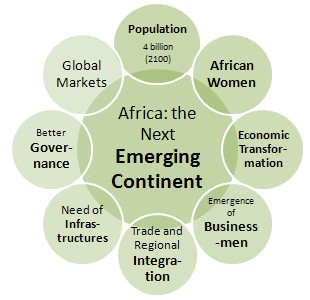
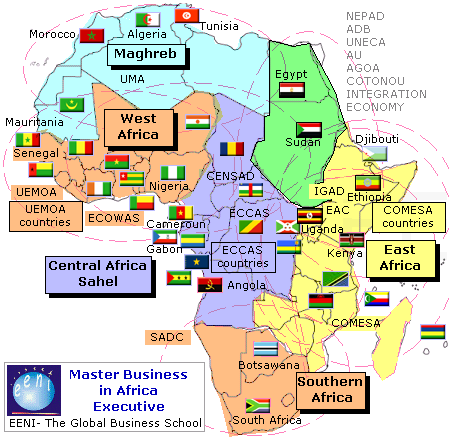
Subjects of the module “African Economic Areas”
1- Introduction to the African Civilization
- The African continent
- Geography of Africa
- African ethnic groups
- African major languages: English, French, Portuguese, Arabic, and Swahili.
- Spanish is the official language of the African Union and Equatorial Guinea
- Trends of the African population
- Religions in Africa
- Islam
- Christianity
- African Traditional Religions
2- History of Africa.
- Leadership of Africa in the history of humanity
- African Prehistory
- Ancient African Civilizations
- Africa (7th - 11th Century)
- Africa (12th 16th Century)
- Africa (16th - 18th Century)
- Abolition of Slavery
- Colonial domination
- Independence
3- Key Economic Institutions of the African Civilization.

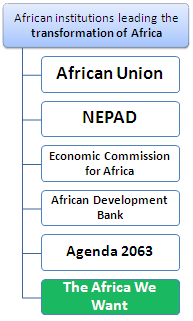

Economic Integration of the African Civilization (Economic Organizations, Trade Agreements).
- Agreements and institutions covering all the African Economic Areas
- Integration in West Africa
- Integration in Central Africa
- Integration in Southern Africa
- Integration in East Africa

African Economic Area and integration in Sub-Saharan Africa. Economic profile of the member countries of the African Civilization
From the economic integration of the African Civilization we can identify the following economic areas that bring together fifty-four African Countries:
- West African Economic Area
- Central African Economic Area
- Southern African Economic Area
- East African Economic Area
- Maghrebian Economic Area
Economic Integration of the African Civilization.
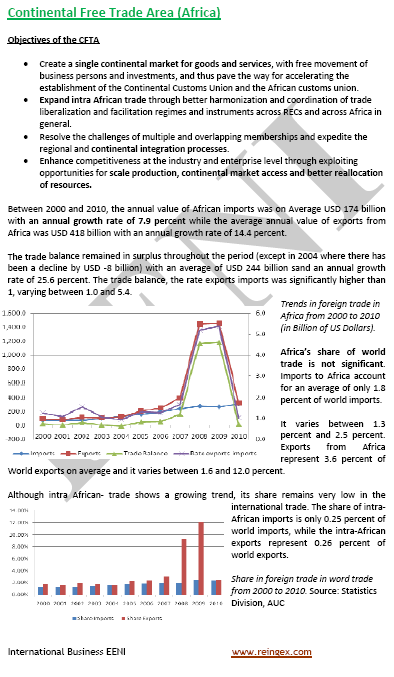
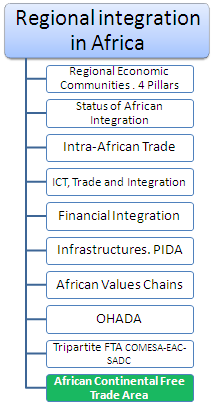
Twenty-six African Countries of the East African Community (EAC), the COMESA, and the SADC have created this innovative agreement of the African Integration that allows creating a market of 527 million Africans.
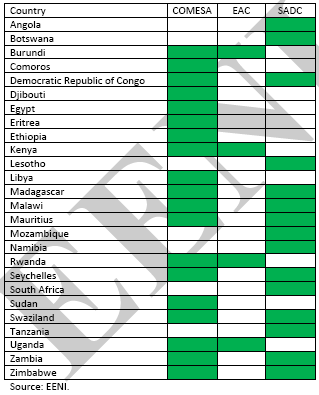
- The Common Market for Eastern and Southern Africa (COMESA)
consists of:
- Fourteen countries of East Africa: The Comoros, Djibouti, Egypt, Eritrea, Ethiopia, Kenya, Madagascar, Malawi, Mauritius, the Seychelles, Sudan, South Sudan, Tanzania, and Uganda
- Three nations of Central Africa: Burundi, the DR Congo, and Rwanda
- Three Southern African Countries: Eswatini, Zambia, and Zimbabwe
- Libya
- The Southern African Development Community (SADC)
consists of:
- Six East African Countries: Malawi, Madagascar, Mauritius, Mozambique, the Seychelles, and Tanzania
- Two nations of Central Africa: Angola and the DR Congo
- Seven Southern African Countries: Botswana, Lesotho, Namibia, South Africa, Eswatini, Zambia, and Zimbabwe
- The OHADA consists of the following countries of Francophone Africa:
- Nine Western African Countries: Benin, Burkina Faso, Ivory Coast, Guinea-Bissau, Guinea, Mali, Niger, Senegal, and Togo
- Seven nations of Central Africa: Cameroon, the Republic of the Congo, Chad, Gabon, Equatorial Guinea, the Central African Republic and the DR Congo
- One country of East Africa: The Comoros
- The Conference on the Great Lakes
consists of:
- Five East African Countries: Kenya, South Sudan, Sudan, Tanzania, and Uganda
- Six nations of the Central Africa: Angola, Burundi, the Central African Republic, the Republic of the Congo, the DR Congo, and Rwanda
- One country of Southern Africa: Zambia
- Guest countries: Botswana, Egypt, Ethiopia, Malawi, Mozambique, Namibia, and Zimbabwe
- Nile Basin Initiative
- Seven East African Countries: Egypt, Ethiopia, Kenya, South Sudan, Sudan, Tanzania, and Uganda
- Three nations of Central Africa: Burundi, the DR Congo, and Rwanda
- Eritrea is an observer country
- Trade Agreements: Southern African Development Community (SADC) - Mozambique, Malawi, Tanzania, and Zambia (SADC-MMTZ)
- Trade Preferential System (OIC-TPS)
- Of all the African Countries only Morocco has signed the Framework Agreement + PRETAS (Protocol on the Preferential Tariff Scheme) + Rules of origin
- Seventeen African nations (Egypt, Guinea, Mauritania, Niger, Sudan, Somalia, Tunisia, Sierra Leone, the Gambia, Guinea-Bissau, Burkina Faso, Cameroon, the Comoros, Djibouti, Benin, Nigeria, and Ivory Coast) have signed the Framework Agreement + PRETAS
- Chad, Gabon, Libya, Senegal, and Uganda only have signed the Framework Agreement
- Algeria, Mali, Mozambique, and Togo have not ratified the Agreement yet
- The Community of Sahel-Saharan States (CEN-SAD) is mainly composed of the African Muslim Countries:
- Thirteen Western African Countries: Benin, Burkina Faso, Cape Verde, Ivory Coast, the Gambia, Guinea, Guinea-Bissau, Liberia, Mali, Niger, Nigeria, Senegal, and Togo
- Two Central African Countries: The Central African Republic, and Chad
- Five nations of East Africa: Egypt, Eritrea, Somalia, Sudan, and Djibouti
- Four countries of the Maghreb: Libya, Morocco, Mauritania, and Tunisia
- The Niger Basin Authority consists of
- Seven Western African Countries: Benin, Burkina Faso, Ivory Coast, Guinea, Mali, Niger, and Nigeria
- Two nations of Central Africa: Cameroon and Chad
Transport and Logistics in Africa.

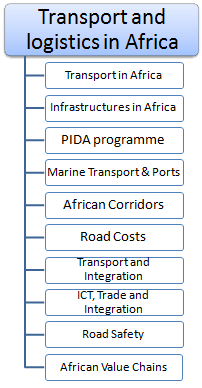
- Infrastructures in Africa
- African Transport Corridors
- Marine Transport in Africa
- African Value Chains
- Information and communication technologies (ICT) and integration in Africa
Interactions of the African Civilization with the other civilizations.
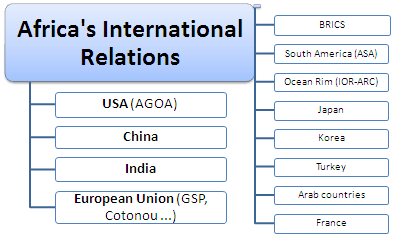
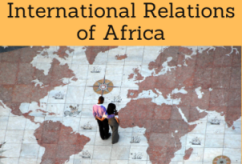
- Islamic Civilization
- Hindu Civilization
- Western Civilization
- Sinic Civilization
- Buddhist Civilization
- Orthodox Civilization
Africa was the cradle of humanity, and according to the UNICEF “The future of humanity is increasingly African.”
- The current African population is 1,100 million people
- In 2100, will be 4,000 million people
- In thirty-five years, 25% of the world's population will be African
South Africa has been the African economic engine and political leader, but Nigeria could become the Central State. Nigeria is already the first African Economy, ahead of South Africa, and with 1,000 million people in 2100.
There is also no doubt that great civilizations and empires have emerged in Africa throughout the history of humanity: Nimrod, Carthage, Egypt, the African Empires (Ghana, Ethiopia, Mali, Wolof, Songhai).
Maybe if we exclude the Maghreb, Egypt, Sudan, and Djibouti (countries with Muslim majorities, and Arabic race, except the last two), there is no doubt that the rest of the African nations forms a socio-cultural unity.
This African Civilization is identified in the space and includes Sub-Saharan Africa. Moreover, above all to belong to a black race the primal of humanity, from which the humanity descend.
A civilization in which most of the borders are the result of the post-colonialism, and certainly; they should disappear in the long-term.
A region with common key challenges:
- Diseases (AIDS, Malaria...)
- Poverty
- Lack of infrastructures
- Full integration into the global economy
- “Sinicization” of Africa (i.e., the Chinese economic colonization of Africa)
- Inter-Religious clash (Sudan, Nigeria, Sahel)
Moreover, with great common opportunities:
- Negotiation as an African economic bloc to the rest of the World (preferential market access, subsidies reduction in the EU or the U.S.)
- African Integration
- South-South trade, especially with Asia and Latin America (Iberian America)
- Control of the value chain for exporting raw materials. Stop exporting raw materials to export value-added products
- Joint exploitation of the vast African energy resources
A civilization in which the African Union is playing an essential role.
Two countries can surely become the Central States of the African Civilization: Nigeria (80 million Muslims and 80 million Christians) and/or South Africa (Christianity).
From a cultural perspective we can identify two areas:
- North Africa area. The Maghrebian Economic Area consists of Egypt, Libya, Tunisia, Algeria, Morocco, Mauritania, and the Western Sahara, which also belongs to the Islamic Civilization. Because of its economic integration (COMESA and the tripartite agreement), Egypt and Libya are assigned to East African Economic Area
- Sub-Saharan Africa Economic Area (Nigeria/South Africa)
- Christian Economic Area, mainly covering the countries south of the Sahel
- Muslim Economic Area, mainly covering the Sahel countries (from Senegal to Sudan)
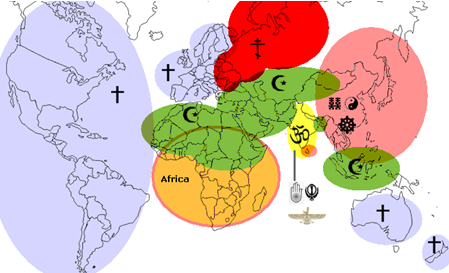
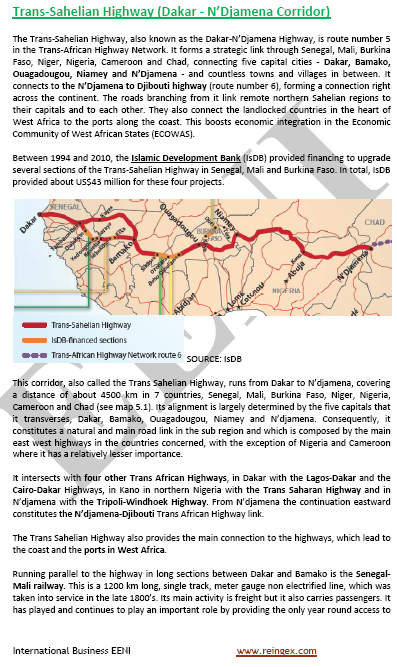
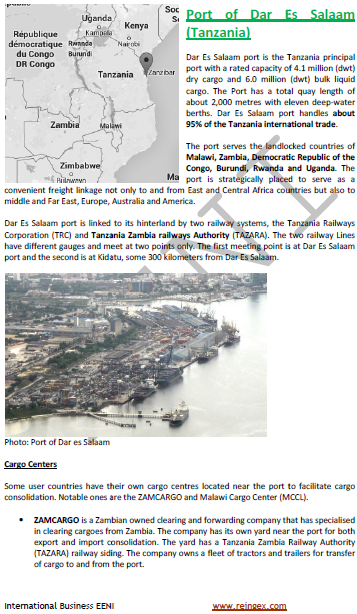
(c) EENI Global Business School (1995-2024)
We do not use cookies
Top of this page


